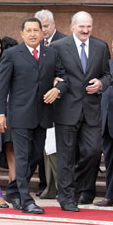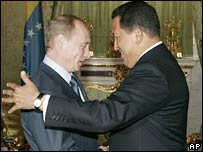Referendum or bustThe game now is quite clear. The latest polls suggest the government would lose the consultative referendum 60-40 at best, as much as 71-29 by some measures…a political disaster for Chávez. So the government has to go all out to obstruct the referendum, and the opposition needs to do whatever it takes to press for it. That’s the game we’re playing now, and while the political momentum is clearly with the opposition, nothing is improbable here.
The first skirmish went to the opposition, when the Supreme Tribunal refused to rule on a strange petition by Chávez to suspend all the members of the National Elections Council (CNE), which would have made it impossible to hold any kind of vote. It’s really not clear why the Tribunal sided against the prez, and there’s all kinds of speculation about, though the government is taking it as proof that they don’t really own the Supreme Tribunal, like the opposition says. Right.
It’s pretty clear that the government will keep obstructing the vote. PPT has already filed another injunction at the tribunal saying that the proposed question is unconstitutional. The Tribunal’s decision on that case is of utmost importance. The opposition is quite clear that they won’t negotiate away the will of the 2 million people who signed a petition for a vote, and if the government does manage to block it, all bets are off.
The coordinadora democrática is committed to calling an open-ended General Strike if a vote is blocked. In a sense, it’s win-win for the opposition on this score: if there is a vote, Chávez is toast. If he blocks a vote on a technicality, he’ll lose the last shard of democratic legitimacy he might still retain.
There is still the question of the shambolic CNE, universally agreed to be a mess of nepotism and incompetence. Gambling the nation’s future on a referendum means putting ourselves in the hands of these no-hopers. It’s not the best of all possible worlds, but it’s the one we've got.
Please comment responsibly:
|
I wasn't that excited about this week's VenEconomy editorial, but my boss insists that primaries are absolutely crucial and that we have to start writing about them now.
Primaries, pleaseMonday, November 4 was a historic day for Venezuela. For the first time, the chavista rhetoric about “participative democracy” where the people are the protagonists took tangible shape – though in a way very far removed from what chavismo had envisioned. Handing in over 2 million signatures to demand a consultative referendum, the opposition made a decisive show of how far it has come since the inchoate days of April – polishing its credentials with irreproachably democratic actions. As Juan Manuel Raffali said, Monday’s actions will divide the history of the opposition movement into “before” and “after.”
The country was hardly surprised by the reception received at the hands of the government’s most militant supporters. It barely seems strange any longer that activists bearing citizens’ signatures to demand a referendum were branded “fascists” by their opponents. It’s hardly even newsworthy that some of the government’s backers fired guns into the opposition crowd, wounding at least nine, including a reporter whose life was saved only by the bullet-proof vest that has become standard equipment for journalists. These acts of barbarism have been seen so often that they’re almost commonplace by now. Yet they continue to shine a spotlight on the government’s dwindling democratic legitimacy, and on its growing embrace of violence as a way to hang on to power. On the whole, it was yet another public relations disaster for the president’s incongruous campaign to maintain a patina of democratic civility.
Yet the hard part is only starting for the opposition. As the momentum builds towards a referendum, the once seemingly distant prospect of a presidential election looks more and more likely within a relatively short period of time – six months, say. With the collapse of the chavista regime accelerating, the prospect of power has already started to poison the cooperative relationship within the Coordinadora Democrática. To the extent that the Coordinadora’s members begin to see each other less as partners in a common struggle and more as soon-to-be electoral competitors, the cooperative spirit that has marked the last few weeks could start to fray.
So, paradoxically, this present time marks both the peak of the Coordinadora’s prestige and its most dangerous juncture yet. As elections loom ever closer, it’s crucial that its members continue to reaffirm their commitment to work collaboratively, eschewing the temptation to grandstand for electoral advantage. It won’t be easy: grandstanding is, one sometimes feels, hardwired into the way many Venezuelan politicians conceive of their jobs. But at this juncture, the cost of division is simply too high to bear; dividing the opposition is the president’s last remaining hope for remaining in office.
In a nightmare scenario, three or four opposition candidates, including at least two heavy-hitters, would run for election against Chávez, splitting the vote enough to allow him back into office. Of course, the president could conceivably try to increase the chances of that happening by finding some way to call a new election very soon, leaving the opposition no time to choose a single candidate. This might contradict everything Chávez has been saying for several months now, but it would not be the first such radical turnabout for him. Certainly, from a rational choice point of view, it’s probably his best option. Yet even in an abrupt-election scenario it’s conceivable that opposition voters would flock to whichever candidate looks to have the greatest chance of defeating Chávez – conceivable, but by no means a foregone conclusion.
The only way to really ensure that the president is defeated cleanly at what now looks like an inevitable presidential election a few months down the road is for the opposition to agree on a single candidate. It’s crucial that the choice be fully democratic, legitimate and binding on the entire Coordinadora. And the only way to achieve that is for the single candidate to be selected through a primary election, preferably in two rounds.
This would certainly be a radical innovation for Venezuela, but in the present climate of heightened democratic sensibilities, and given renewed revulsion with old-style backroom political deal-making, the Venezuelan opposition looks ready for such bold proposals. Spurred on by the growing urgency of making sure President Chávez leaves office, the proposal might just catch on. This will, in any case, be the next great debate within the Coordinadora.
Some might think it too early to be speculating on such topics. After all, it’s not even clear that a consultative referendum will be held at this point, much less that Chávez will face his opponents head-to-head at the ballot box any time soon. But given his vested interest in splitting the opposition by holding elections sooner rather than later, an ounce of prevention will be better than a pound of cure. If the Coordinadora doesn’t launch a serious debate now on the method for selecting a single candidate, it could be caught out by a chavista power-play; after all, even if elections were called for next April, that would leave a fairly short window in which to organize a primary and hold a serious public debate. So it’s not at all too early to start talking about primaries. It will soon be too late.
Please comment responsibly:
|
Incitement = Violence It keeps happening. Time and again we think we've hit bottom, that the political scene can't possibly sink any lower into this goopy mishmash of the ridiculous and the grotesque. And then it does.
The latest low came Monday afternoon, when the reactionary and fascist forces of the squalid opposition tried to perpetrate yet another fraud against the constitution in their quest to destroy democracy. Now, read that last sentence again. Admittedly, I've compressed, but I haven't made anything up - each of those insults was actually hurled at the opposition yesterday, and by high ranking government officials too. And what was the outrage these fascists committed? Why, they went around, clipboard in hand, asking people to sign a petition to hold a referendum on whether or not to ask Chavez to resign voluntarily. Just like the black shirts! And then, then, they had the gall to try to march peacefully to the National Elections Council to hand in the two million + signatures they'd gathered! Straight out of Mussolini's playbook...
All of which would be funny if it wasn't for one pesky little detail: some of Chavez' more simple-minded followers actually buy the rhetoric. The incitement that pours out of every government official every time s/he gets near a microphone has real consequences. Yesterday, those consequences came in the form of (at least) 9 people hospitalized with gunshot wounds. One TV cameraman was shot in the chest, saved only by the bullet-proof vest he was wearing. Other cameramen got clear pictures of at least one guy in a ski mask unloading an automatic gun into the opposition march. In one especially hair-raising episode, Alfredo Peña relates that a tear gas canister was tossed into an ambulance as it attempted to carry away three wounded opposition protesters.
Lina Ron - who's still not in jail - was on hand, of course, to lead the glorious revolutionary counteroffensive against the fascists. Eventually the National Guard and the Metropolitan Police had to step in and dissolve the crowd with teargas. It took the opposition march over 3 hours to cover the final three blocks to CNE, while PM and GN troops tried to deal with the chavista countermarch.The sad thing is that, at this point, this kind of barbarity barely even shocks people anymore...it's at least the seventh time it's happened since April. It's basically becoming routine for chavistas to shoot live ammo into opposition crowds.
Needless to say, the government finds none of this objectionable. VP Rangel actually went on TV to congratulate the civilized attitude of both the opposition AND the government crowds. Maybe Chavez's psychiatric problems are contagious: downtown was a chaos of bullets and teargas as he was making that statement. Why would he object, though? As Teodoro Petkoff points out in TalCual today, Chavez already crossed that rubicon by branding the Llaguno Bridge gunmen from April 11th as "heroes" for "defending the revolution." What's changed? Nothing's changed.
The scary thing about the government's whacked out rhetoric is that it creates a climate where chavista hotheads feel fully justified unloading their guns onto their political opponents, where they're led to believe they're on the side of goodness and history and right when they battle the forces of reactionary evil with anything they can get their hands on. Their revered leader singles out people who act that way for praise. So, needless to say, they're in no doubt that, so long as the comandante is in power, they'll never be held accountable for what they're doing.
At least the signatures are in now. They're probably the hottest political hot potato Venezuela has ever seen. The Elections Council is in a dreadful state, but it's just going to have to deal with it: the constitution is very clear in giving it just 30 days to either call a referendum or invalidate the request, and a new CNE can't be named that quickly. They'll probably approve it, and the government will certainly challenge it in court...and that...that's when the sparks are gonna fly...
Please comment responsibly:
|

 Chavez Reelection Blog: Katy documents the government's use of public resources for Chavez's partisan advantage.
Chavez Reelection Blog: Katy documents the government's use of public resources for Chavez's partisan advantage.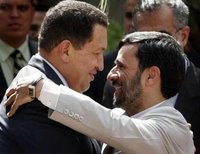
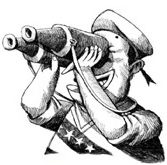
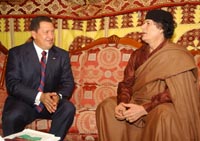
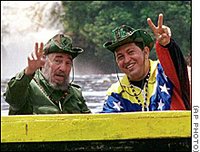
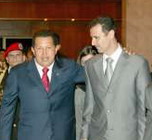
 Site feed
Site feed 